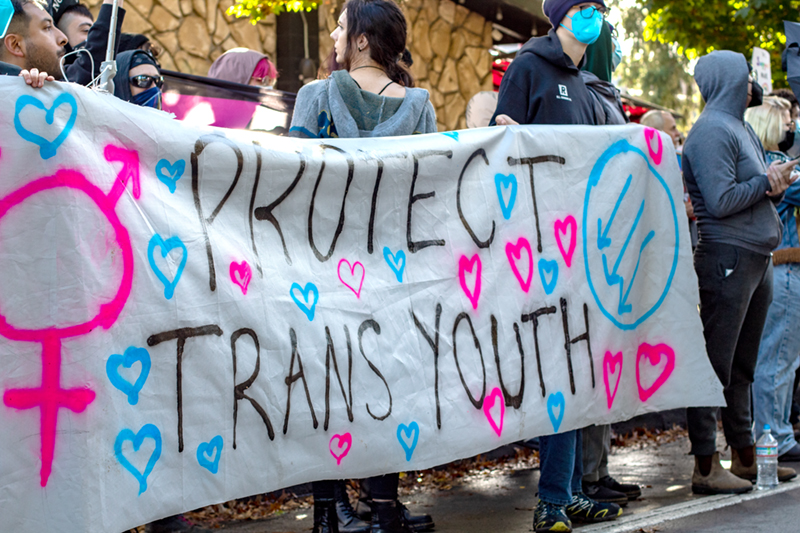American Medical Association urges governors not to interfere with trans children’s health care
Leading medical association says denying gender-affirming care can result in devastating mental and physical health consequences.
By John Riley on April 30, 2021 @JRileyMW

The American Medical Association has warned governors to oppose legislation that seeks to prevent transgender minors from accessing gender-affirming care, calling such measures “a dangerous intrusion into the practice of medicine.”
In a letter addressed to Bill McBride, the executive director of the National Governors Association, the AMA, the country’s most respected medical association, cited evidence that transgender and nonbinary gender identities are “normal variations of human identity and expression,” and warned that limiting access to gender-affirming care, in the form of puberty blockers, hormones, or surgery, can have mental and physical health consequences.
“For gender diverse individuals, standards of care and accepted medically necessary services that affirm gender or treat gender dysphoria may include mental health counseling, non-medical social transition, gender-affirming hormone therapy, and/or gender-affirming surgeries,” James Madara, the CEO and executive vice president of the AMA, wrote in the letter.
“Clinical guidelines established by professional medical organizations for the care of minors promote these supportive interventions based on the current evidence and that enable young people to explore and live the gender that they choose. Every major medical association in the United States recognizes the medical necessity of transition-related care for improving the physical and mental health of transgender people.”
The AMA also condemned the recent spate of bills in close to 30 different state legislatures seeking to block transgender youth from accessing certain treatments for gender dysphoria, criminalize doctors who prescribe such treatments, or — in the case of a bill passed by the Texas Senate — declare parents who affirm their child’s gender identity, even without surgical or hormonal intervention, to be guilty of “child abuse.”
Earlier this month, Arkansas lawmakers overrode a veto by Gov. Asa Hutchinson (R) of a bill that criminalizes doctors prescribing puberty blockers or hormones for minors, threatening them with disciplinary action and the loss of their license to practice, and even goes so far as to allow private insurance to deny coverage for medically necessary transition-related care for adults.
The American Civil Liberties Union has already threatened legal action over the Arkansas bill, and says it will also pursue a lawsuit should the Texas bill pass. Its Texas affiliate has already dubbed the bill “cruel and unconstitutional,” citing the AMA’s opposition as evidence of the bill’s extremist agenda.
“Decisions about medical care belong within the sanctity of the patient-physician relationship,” the AMA’s letter to the National Governors Association reads. “As with all medical interventions, physicians are guided by their ethical duty to act in the best interest of their patients and must tailor recommendations about specific interventions and the timing of those interventions to each patient’s unique circumstances. Such decisions must be sensitive to the child’s clinical situation, nurture the child’s short and long-term development, and balance the need to preserve the child’s opportunity to make important life choices autonomously in the future.
“We believe it is inappropriate and harmful for any state to legislatively dictate that certain transition-related services are never appropriate and limit the range of options physicians and families may consider when making decisions for pediatric patients,” the letter continues.
The AMA also noted in its letter that transgender individuals are up to three times more likely than the general population to report or be diagnosed with mental health or substance use disorders, due in part to stress, societal stigma, loneliness and isolation, and discrimination. That stress also poses a risk to transgender youth, prompting many of them to consider suicide.
Furthermore, the AMA notes, multiple studies show that access to gender-affirming care reduces the rates of depression, anxiety, suicidal ideation among patients, leading to overall improvements in mental health — as well as physical health, because trans individuals will not seek out “gray market” or “black market” hormones, silicone injections, or other potentially unsafe medical interventions.
“Transgender children, like all children, have the best chance to thrive when they are supported and can obtain the health care they need,” the letter concludes. “It is imperative that transgender minors be given the opportunity to explore their gender identity under the safe and supportive care of a physician. Arkansas’s law and others like it would forestall that opportunity. This is a dangerous intrusion into the practice of medicine and we strongly urge the NGA and its member governors to oppose these troubling bills.”
Read more:
Openly gay pilot leaving Navy after homophobic harassment
New Jersey vice principal threw beer at child after rant about trans woman using women’s bathroom
Alabama governor signs bill to remove anti-gay language from sex education curriculum
More from Metro Weekly:
Seattle Children’s Investigated by HHS Over Trans Youth Care
The probe follows a Kennedy-issued declaration that threatens hospitals with loss of federal funding over gender-affirming care.
By John Riley on December 31, 2025 @JRileyMW
The U.S. Department of Health and Human Services has launched an investigation into Seattle Children's Hospital over its alleged provision of gender-affirming care to transgender minors, a practice the Trump administration has aggressively sought to end.
In a post on X, the HHS official account said the hospital had been referred to the Office of the Inspector General for "failure to meet professional recognized standards of health care" under a declaration issued on December 18 by HHS Secretary Robert F. Kennedy, Jr., according to The Hill.
What Trump’s Return Has Cost LGBTQ Lives in D.C.
From housing and health care to jobs and security, Washington’s LGBTQ community is paying the price of a second Trump presidency.
By Will O'Bryan on January 17, 2026
Little more than a year ago, Kamala Harris narrowly lost the presidential election. She may have suffered a swing-state sweep, but Donald Trump's 49.8 percent win was hardly a mandate. Consider Franklin D. Roosevelt won his first term with a bit more than 57 percent. That's a mandate.
But lose, she did. And I cried twice. Some frail dudes might not like admitting that, but I'm not so self-loathing that I'm compelled to deny human emotions. Initially, maybe a day after the vote, talking to a neighbor on our building's shared roof, my throat seized mid-sentence and I excused myself. I may have plenty to cry about, but I don't ever want it to make me the center of attention.
HHS Moves to Cut Off Trans Youth Health Care
The Trump administration is proposing rules that would strip hospitals of federal funding for providing transition-related care to minors.
By John Riley on December 19, 2025 @JRileyMW
The Trump administration has proposed two federal rules that would restrict access to gender-affirming care for transgender minors nationwide.
The proposed regulations, issued by the U.S. Department of Health and Human Services' Centers for Medicare and Medicaid Services (CMS), would bar federal Medicaid funds from covering transition-related care for transgender youth under 19 and threaten to strip federal funding from hospitals that provide gender-affirming treatments to minors.
HHS officials told NBC News that CMS will begin the federal rule-making process with a 60-day public comment period, after which the rules could be finalized.
Support Metro Weekly’s Journalism
These are challenging times for news organizations. And yet it’s crucial we stay active and provide vital resources and information to both our local readers and the world. So won’t you please take a moment and consider supporting Metro Weekly with a membership? For as little as $5 a month, you can help ensure Metro Weekly magazine and MetroWeekly.com remain free, viable resources as we provide the best, most diverse, culturally-resonant LGBTQ coverage in both the D.C. region and around the world. Memberships come with exclusive perks and discounts, your own personal digital delivery of each week’s magazine (and an archive), access to our Member's Lounge when it launches this fall, and exclusive members-only items like Metro Weekly Membership Mugs and Tote Bags! Check out all our membership levels here and please join us today!
The Magazine
-
Most Popular
 Chicago-Area Teen Used Sniffies to Lure and Rob Uber Driver
Chicago-Area Teen Used Sniffies to Lure and Rob Uber Driver  Texas Judge Upholds Campus Drag Ban, Likens it to "Blackface"
Texas Judge Upholds Campus Drag Ban, Likens it to "Blackface"  Hockey Player Says 'Heated Rivalry' Inspired Him to Come Out
Hockey Player Says 'Heated Rivalry' Inspired Him to Come Out  Gay Alexandria Councilman Wins Delegate Primary
Gay Alexandria Councilman Wins Delegate Primary  Jason Elliott on His Year as Mr. Mid-Atlantic Leather
Jason Elliott on His Year as Mr. Mid-Atlantic Leather  Former Space Force Colonel Bree Fram to Run for Congress
Former Space Force Colonel Bree Fram to Run for Congress  The History of the Hanky Code
The History of the Hanky Code  Man Sentenced to 21 Years in Killing of Daniel Landeros
Man Sentenced to 21 Years in Killing of Daniel Landeros  5 Takeaways from New Survey on LGBTQ Life Under Trump
5 Takeaways from New Survey on LGBTQ Life Under Trump  Douglas Sills Finds Himself in Tevye
Douglas Sills Finds Himself in Tevye
 Former Space Force Colonel Bree Fram to Run for Congress
Former Space Force Colonel Bree Fram to Run for Congress  Gay Alexandria Councilman Wins Delegate Primary
Gay Alexandria Councilman Wins Delegate Primary  Texas Judge Upholds Campus Drag Ban, Likens it to "Blackface"
Texas Judge Upholds Campus Drag Ban, Likens it to "Blackface"  Chicago-Area Teen Used Sniffies to Lure and Rob Uber Driver
Chicago-Area Teen Used Sniffies to Lure and Rob Uber Driver  Man Slashed on NYC Subway for Kissing Trans Partner
Man Slashed on NYC Subway for Kissing Trans Partner  Man Sentenced to 21 Years in Killing of Daniel Landeros
Man Sentenced to 21 Years in Killing of Daniel Landeros  Gay Former Sales Manager Sues Pittsburgh Steelers
Gay Former Sales Manager Sues Pittsburgh Steelers  Hockey Player Says 'Heated Rivalry' Inspired Him to Come Out
Hockey Player Says 'Heated Rivalry' Inspired Him to Come Out  From the Archives: A 1997 Q&A With the D.C. Eagle’s Dick McHugh
From the Archives: A 1997 Q&A With the D.C. Eagle’s Dick McHugh  Jason Elliott on His Year as Mr. Mid-Atlantic Leather
Jason Elliott on His Year as Mr. Mid-Atlantic Leather
Scene
Metro Weekly
Washington's LGBTQ Magazine
P.O. Box 11559
Washington, DC 20008 (202) 527-9624
About Us pageFollow Us:
· Facebook
· Twitter
· Flipboard
· YouTube
· Instagram
· RSS News | RSS SceneArchives
Copyright ©2025 Jansi LLC.















You must be logged in to post a comment.